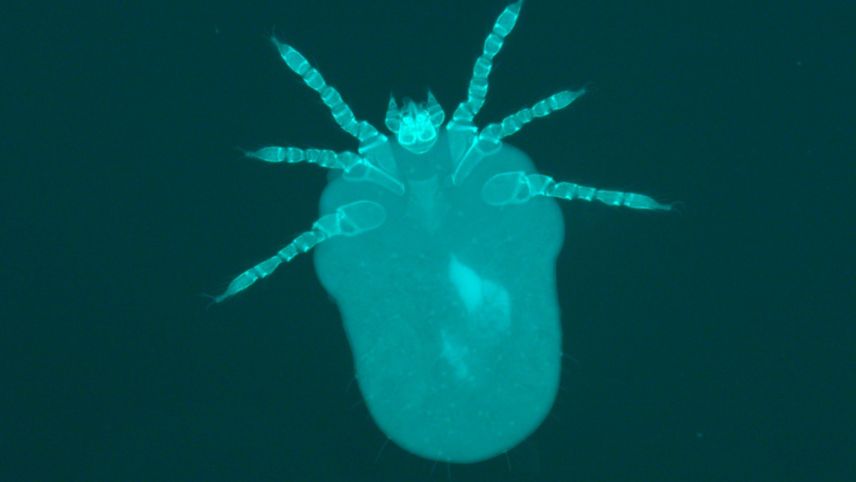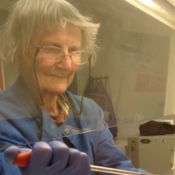Obligate intracellular bacteria: From bench to field and bedside

Theo Murphy meeting organised by Dr Jing Jing Khoo, Dr Jeanne Salje and Dr Richard Hayward.
Obligate intracellular bacteria include a wide range of bacteria with medical and veterinary importance. Rickettsiales and Chlamydiales include numerous important human, livestock and wildlife pathogens. Other members include arthropod symbionts that could be implicated in the control of arthropod disease vectors. This meeting will be the first in the UK having researchers and clinicians from multi-disciplinary backgrounds (from infection biology to ecology) to share the latest insights and generate new research directions linking both pathogens and symbionts.
Programme
The programme, including speaker biographies and abstracts, will be available soon. Please note the programme may be subject to change.
Poster session
There will be a poster session from 4.30pm on Monday 3 November 2025. If you would like to present a poster, please submit your proposed title, abstract (up to 200 words), author list, and the name of the proposed presenter and institution to the Scientific Programmes team. Acceptances may be made on a rolling basis so we recommend submitting as soon as possible in case the session becomes full. Submissions made within one month of the meeting may not be included in the programme booklet.
Attending the event
This event is intended for researchers in relevant fields.
- Free to attend and in-person only
- When requesting an invitation, please briefly state your expertise and reasons for attending
- Requests are reviewed by the meeting organisers on a rolling basis. You will receive a link to register if your request has been successful
- Catering options will be available to purchase upon registering. Participants are responsible for booking their own accommodation. Please do not book accommodation until you have been invited to attend the meeting by the meeting organisers
Enquiries: Contact the Scientific Programmes team.
Organisers
Schedule
Chair
Professor Richard Birtles
University of Salford, UK
Professor Richard Birtles
University of Salford, UK
| 09:00-09:05 |
Welcome by the Royal Society & Dr Jing Jing Khoo
|
|---|---|
| 09:10-09:30 |
Recent advances in our understanding of the biology and intracellular lifecycle of Orientia tsutsugamushi
Orientia tsutsugamushi is the etiological agent of scrub typhus, a neglected but life-threatening vector-borne disease that poses a growing threat to public health across the Asia-Pacific region and beyond. Unlike many intracellular bacteria, O. tsutsugamushi is an obligate cytoplasmic pathogen, replicating freely within the host cell cytosol rather than within a vacuolar compartment. This unusual lifestyle is supported by a highly non-canonical cell envelope whose structure and composition deviate markedly from classical Gram-negative paradigms. In this talk, I will highlight recent advances from our group that shed light on the unique biology of O. tsutsugamushi. Specifically, I will discuss our structural and functional analyses of the bacterial cell envelope, revealing adaptations that shape its interactions with host membranes and immune surveillance. I will also present new findings on the intracellular infection cycle, focusing on the molecular mechanisms governing bacterial trafficking along host microtubules, as well as the dynamic interplay between O. tsutsugamushi and key host cell factors. Together, these insights refine our understanding of how this highly adapted pathogen subverts eukaryotic cell biology to support survival and dissemination. 
Dr Jeanne SaljeUniversity of Cambridge, UK 
Dr Jeanne SaljeUniversity of Cambridge, UK Dr. Salje is an Assistant Professor and Wellcome Trust Senior Research Fellow at Cambridge University at the University of Cambridge, with joint appointments at the Department of Biochemistry, the Department of Pathology, and the Cambridge Institute for Medical Research. She is also a Fellow at St. John's College and an Honorary Visiting Research Fellow at the Mahidol Oxford Tropical Medicine Research Unit in Bangkok, Thailand. Her lab works on the cell biology of Orientia tsutsugamushi. |
| 09:30-09:50 |
Genome-wide CRISPR/Cas9 screen reveals an important role for sphingolipids in maintaining the integrity of the parasitophorous vacuole of Chlamydia trachomatis
The obligate intracellular bacterial pathogen Chlamydia trachomatis employs the secreted effector CpoS to modulate host cellular membrane trafficking and suppress a host defense response that aborts intracellular pathogen growth by inducing host cell death. To identify the molecular basis of this defense evasion, we applied a host-directed genome-wide CRISPR/Cas9 screening approach. Interestingly, this work revealed a CpoS-deficient mutant to exhibit a markedly increased dependence on host cellular synthesis of ceramides, the precursors of complex sphingolipids. Using novel microscopic reporters, we established that CpoS’ role in defense evasion involves preserving the integrity of Chlamydia’s parasitophorous vacuole (the inclusion) by ensuring an adequate sphingolipid supply. More specifically, we found that CpoS-deficient inclusions acquire reduced amounts of sphingolipids and become unstable, leading to the release of bacteria into the host cell cytosol, followed by inclusion rupture and host cell death. Exogenous addition of sphingosine stabilized CpoS-deficient inclusions, whereas disruption of host cellular ceramide synthesis destabilized wild-type inclusions. In combination, CpoS deficiency and impaired ceramide synthesis destabilized inclusions even earlier, resulting in infection clearance and host cell survival rather than host cell death. Overall, this study highlights how the vacuolar pathogen C. trachomatis maintains vacuole integrity by ensuring a steady sphingolipid supply, potentially offering inspiration and directions for future therapeutic strategies targeting parasitophorous vacuoles. 
Dr Barbara SixtUmeå University, Sweden 
Dr Barbara SixtUmeå University, Sweden Dr. Barbara Sixt is a researcher specializing in the obligate intracellular bacterium Chlamydia trachomatis, with a focus on its interactions with human host cells and the development of novel antichlamydial therapies. She earned her doctorate at the University of Vienna (Austria, 2008–2013), investigating the proteomic and metabolic profiles, as well as host interactions, of Chlamydia-related bacteria that naturally infect amoebae or arthropods. She then conducted postdoctoral research at Duke University (USA, 2013–2016) and INSERM (France, 2016–2018), using emerging molecular genetic tools for C. trachomatis to study effector functions and mechanisms of evasion of host cell-autonomous immunity. Since 2018, she has led a research group at Umeå University (Sweden), applying a multidisciplinary approach—including cell culture infection models, genetic and chemical screening, omics technologies, molecular genetic manipulation, biochemical assays, and microscopy—to investigate how Chlamydia maintains its intracellular niche and to identify novel antichlamydial compounds and targets. |
| 09:50-10:10 |
Discussion
|
| 10:10-10:40 |
Break
|
| 10:40-11:00 |
Immune signatures distinct to severe vs. self-limiting outcomes following Orientia tsutsugamushi infection
Scrub typhus is a mite-borne disease due to Orientia tsutsugamushi (Ot) replication in phagocytes and endothelial cells. Scrub typhus patients often have diverse clinical outcomes and strong inflammatory responses, but relatively short-lived immunity. Yet little is known regarding their underlying mechanisms, nor immune signatures to clinically prevalent Ot strains. Our recent studies have revealed differential host susceptibility to Ot strains, with severe outcomes (Karp strain) or self-limiting infection (Gilliam strain) in C57BL/6 mice. This study is aimed at defining Ot strain-associated signatures in macrophage innate sensors, lung inflammatory responses, and splenic B cell responses. We found that 1) Karp infection significantly activated C-type lectin receptors (CLRs) and M1-skewed macrophage responses, but Gilliam infection preferentially stimulated cellular proliferation/DNA replication; and 2) Karp-induced, CLR/M1/Th1-skewed cellular responses in the lungs were correlated with acute tissue injury, vascular dysfunction, and host mortality. Also, Karp-infected spleens had high bacterial burdens and poor germinal center structures (IF staining), likely due to the activation of inflammatory pathways (RNAseq profile) and enhanced influx and activation of M1 macrophages and neutrophils (multi-parameter FACS). Together, our studies for Ot strain- and host organ-based comparison help reveal core immune alterations shared by pathogenic Ot strains, as well as differential immune signatures unique to a given Ot strain. Such evidence helps explain diverse infection outcomes and transient immunity to scrub typhus, opening research directions for this emerging but severely neglected disease. 
Professor Lynn SoongUniversity of Texas Medical Branch, US 
Professor Lynn SoongUniversity of Texas Medical Branch, US Lynn Soong is Professor in the Department of Microbiology & Immunology and Department of Pathology at the University of Texas Medical Branch in Galveston, Texas, USA. Her research focuses on murine models of scrub typhus, especially on cellular and humoral immune responses against different Orientia tsutsugamushi strains, as well as tissue-specific alterations during severe infection. New findings at the tissue, cellular, and molecular levels help understand scrub typhus pathogenesis and immunity. |
| 11:00-11:20 |
Manipulation of the host cytoskeleton by Anaplasma phagocytophilum
Anaplasma phagocytophilum (Ap) secreted effector proteins elicit wide ranging effects on host cell biology to enable intracellular survival. The Ap effector, AnkA, has multiple fields of influence in the mammalian host both in the nucleus and within the cytoplasm, yet evidence indicates that additional host interaction partners of AnkA exist. We employed AnkA immunoprecipitation from Ap infected HL-60 cells with down-stream proteomics to identify novel interaction partners. Most prominent amongst this dataset were the host proteins, actin, and the Wave Regulatory Complex (WRC), a multi-protein host signalling complex. We validated these observations using heterologous expression systems before using a combination of interaction assays and structural biology approaches to identify the motifs that mediate AnkA-actin and AnkA-WRC interactions. Immunofluorescence microscopy revealed that AnkA and its host targets co-localize at the Ap inclusion at key points in the Ap infective cycle. Finally, using biochemical assays, we revealed the influence of AnkA on actin polymerization. These discoveries demonstrate that AnkA exerts multifactorial influence on host actin dynamics by direct inhibition of actin polymerization, sequestration of the WRC (a key regulator of Arp2/3 and branched actin networks), and by influencing the activities of signalling proteins which converge on the WRC-Arp2/3-actin signalling axis. Previous studies have highlighted that actin dynamics are important for Ap infection but the mechanistic basis for this has been elusive. These results partly address this long-standing unknown in the Ap field and reveal a novel mechanism for actin subversion by a microbe. Dr Ian CadbyUniversity of Bristol, UK Dr Ian CadbyUniversity of Bristol, UK Dr. Cadby is a Senior Research Fellow and UKRI Future Leaders Fellow at Bristol Veterinary School at the University of Bristol and is also an honorary lecturer at the University of Birmingham. He established his independent research group in 2022 and is primarily interested in protein structure-function analyses of Anaplasma secreted effectors and the molecular mechanisms underpinning host subversion by this under-studied pathogen. |
| 11:20-11:40 |
Studies of chlamydial inclusion biogenesis
Chlamydia trachomatis is an obligate intracellular bacterial pathogen that remains a major agent of sexually transmitted infection worldwide and infectious blindness (trachoma) in Developing nations. Central to bacterial propagation within host cells is the formation of a specialised membrane-bound compartment, termed an ‘inclusion’. The inclusion serves as a niche for bacterial replication, and as a shield from host detection and treatments. The inclusion membrane is consequently a critical interface between the pathogen and the host, and inclusion biogenesis and integrity are critical for bacterial survival and host infection. Studies have revealed that the bacteria use a variety of virulence effector proteins, translocated via a type III secretion system, to modify the inclusion membrane, recruit host proteins and create an environment favourable for bacterial growth. I will describe some of our recent work on the plasticity and integrity of the inclusion membrane, the control of ion transport across it, and the interaction of the inclusion with host organelles. 
Dr Richard HaywardUniversity of Cambridge, UK 
Dr Richard HaywardUniversity of Cambridge, UK Dr Richard Hayward is an Associate Professor in the Department of Pathology at Cambridge University. He is also a Fellow of Trinity College. His laboratory studies the molecular cell biology of interactions between the host cell and the obligate intracellular bacterium Chlamydia trachomatis. |
| 11:40-12:00 |
Discussion
|
Chair
Dr Alistair Darby
University of Liverpool, UK
Dr Alistair Darby
University of Liverpool, UK
Alistair is a genome scientist with research interests in the symbionts and pathogens of arthropod pests and disease vectors. From his PhD to present he has worked on non-culture viable microbes and used molecular/genomic approaches to describe and understand the biology of interactions between the host arthropod and the microbial partner. He is Co-Director at the Centre for Genomics Research, University of Liverpool, where he heads the single cell sequencing lab.
| 13:00-13:20 |
The Tick Cell Biobank: tick and insect cell lines for isolation, propagation and study of obligate intracellular arthropod-borne bacteria
Continuous cell lines derived from ticks and insects play an increasingly important role in many aspects of research on obligate intracellular bacterial pathogens and symbionts. The Tick Cell Biobank (TCB) was founded over 16 years ago at the University of Edinburgh, initially as a repository and source of tick cell lines for the international scientific community. More recently, the TCB has expanded to encompass cell lines derived from a range of insect genera including vectors of human, livestock and crop pathogens as well as more beneficial insects such as pollinators. The TCB generates, receives, stores and supplies arthropod cell lines to scientists worldwide, and provides live-streamed training and ongoing support, as some of these cell lines can be quite challenging to maintain. The TCB portfolio contains cell lines derived from most of the economically important tick-borne disease vectors including multiple species of the genera Ixodes, Rhipicephalus, Hyalomma, Amblyomma and Dermacentor, and a growing collection of insect cell lines derived from mosquitoes, biting midges, sand flies, tsetse flies, triatomine bugs, fruit flies and honey bees. Methods used in the TCB for generating arthropod cell lines and examples of their application in isolation, propagation and study of intracellular bacteria will be presented. Further information about the TCB and the currently-available cell lines is available on our website https://www.liverpool.ac.uk/research/facilities/tick-cell-biobank/. 
Dr Lesley Bell-SakyiUniversity of Liverpool, UK 
Dr Lesley Bell-SakyiUniversity of Liverpool, UK Until her retirement earlier this year, Lesley Bell-Sakyi managed the Tick Cell Biobank, the world’s largest collection of continuous cell lines derived from ticks and other arthropods, which she co-founded in 2009. Her particular expertise lies in the establishment of continuous cell lines (74 to date) from embryonic, larval, nymphal and adult tissues of a range of tick and insect species, and the propagation and study of viral, bacterial and protozoan pathogens in arthropod cell and organ culture systems. She has worked with intracellular bacteria of the genera Anaplasma, Ehrlichia, Rickettsia, Spiroplasma and Wolbachia. Lesley’s career spans 48 years of research on arthropods and arthropod-borne pathogens of livestock and humans at University of Edinburgh, (1977-2012), the Pirbright Institute (2012-2017) and University of Liverpool (since 2017). She holds degrees of BSc in Biology (Aberdeen, 1976), MPhil (Edinburgh, 1983) and PhD (Utrecht, 2004), and has co-authored >145 research papers. |
|---|---|
| 13:20-13:40 |
Identification of trombiculid mites using a deep learning pipeline trained on phase-contrast and fluorescence micrographs
The larvae of trombiculid mites (Acari; Trombiculidae), “chiggers”, are vectors of bacterial and viral pathogens to humans. Over 50 species are implicated in transmitting Orientia spp., the bacteria causing scrub typhus. Identification is challenging and laborious, particularly to species level, and relies on examining minute external structures. There are few recognized experts worldwide and few up-to-date taxonomic keys. To address these challenges, we developed an automated image-based identification approach focused on the scutum, a key taxonomic structure. Phase-contrast and fluorescence micrographs from Thailand, Malaysia and Laos were collated. To enable automated identification, we developed a two-stage deep learning pipeline. The first stage used a Mask R-CNN model to detect and segment the scutum. Detected regions were cropped with 10% padding to ensure complete feature capture. The second stage performed species-level classification on cropped regions using an EfficientNet-B3 architecture. To improve generalization and prevent overfitting, we applied a range of data augmentation techniques. The model was tested using a subset of images. A total of 647 images of 11 chigger species were used from the genera Ascoschoengastia, Leptotrombidium, Walchia , and Schoengastiella. The pipeline was tested using 142 images. The pipeline correctly predicted the species for 116/142 (82%) images. Genus was correctly identified in (95%) images. The most frequent error was Ascoschoengastia incorrectly identified as Walchia spp. 3/26 (12%). At species level 3/23 (13%) L. deliense were incorrectly predicted as L. imphalum and among the Walchia group, 13/70 (19%) images were assigned to a different Walchia species. To our knowledge this is the first attempt to develop an AI pipeline to assist with chigger identification. Accuracy was remarkably high, even to species level, despite the method employing only an image of the scutum. Larger numbers of images and further technical improvements will increase accuracy. Our goal is to provide an open-access pipeline greatly enhancing accessibility of accurate chigger identification and facilitating much-needed, health-related ecological research. Dr Ivo ElliotUniversity of Oxford, UK Dr Ivo ElliotUniversity of Oxford, UK Ivo Elliott completed a Wellcome Trust Research Training Fellowship and DPhil at the University of Oxford in 2019. His research investigated the clinical epidemiology and ecology of scrub typhus in humans, chiggers and rodents and took place in Thailand and Laos. Ivo is now an Infectious Diseases and Microbiology physician based in Oxford and is an Honorary Senior Clinical Lecturer at the University of Oxford. His research interests include the ecology of infectious diseases, in particular rodent and vector-borne zoonoses. He is active in the small world of Rickettsial research, supporting PhD students and collaborating with groups across the Asia-Pacific and in the Americas. |
| 13:40-14:00 |
The potential of Wolbachia bacteria to control malaria
Malaria is caused by Plasmodium parasites transmitted through the bites of infected Anopheles mosquitoes. The WHO’s World malaria report estimates 263 million cases and 597,000 malaria deaths in 2023 (an increase of 11 million cases from 2022). 95% of mortality occurs in the WHO African Region which lacks the infrastructure to prevent, diagnose and treat malaria. Existing vector control strategies using insecticides are failing given the rapid spread of resistance and logistical challenges of continued distribution via bednets or spray campaigns. Rapid urbanisation and climate change have resulted in changing vector distributions and invasion of new species such as the urban vector Anopheles stephensi, which is predicted to result in >126 million more people at risk of future malaria outbreaks. Novel vector control strategies are required – particularly to combat future malaria transmission by Anopheles stephensi. An attractive alternative to insecticides is bacteria that naturally reside within mosquitoes which can stop the transmission of human pathogens. One of the only bacteria that has the capacity to invade and sustain in mosquito populations (required for any release strategy) is Wolbachia, an intracellular, symbiotic bacterium that can induce a reproductive phenotype known as cytoplasmic incompatibility to rapidly spread through mosquito populations. For dengue virus, Wolbachia-infected Aedes aegypti mosquito lines have been released into more than 16 countries with more than 13.5 million people estimated to be protected. Wolbachia-based biocontrol is safe for humans, not classified as genetic modification and already widely accepted. Importantly, it also does not require complex, logistically challenging and highly infrastructure-dependent distribution campaigns like bed nets or mass drug administration, or specific assessments to target specific population groups like vaccinations. Efforts to use Wolbachia-based biocontrol for malaria have been restricted by the inability to generate stable Anopheles lines that balance malaria parasite inhibition and mosquito fitness costs which would prevent population invasion. However, for the first time we have discovered Wolbachia strains in genuine endosymbiosis in wild Anopheles populations giving great hope for a future malaria biocontrol strategy. In this talk, I will outline the status of research in attempting to develop a Wolbachia-based biocontrol for malaria and what future gaps in knowledge are required to replicate the success seen for a significant reduction in arboviral transmission from mass mosquito releases. 
Dr Thomas WalkerUniversity of Warwick, UK 
Dr Thomas WalkerUniversity of Warwick, UK Professor Walker is a Professor of Medical Entomology in the School of Life Sciences at the University of Warwick and his research group studies novel methods of control for insect-borne diseases such as malaria. The focus of their research is on the endosymbiotic bacterium Wolbachia and they explore ways in which this bacterium can be used to reduce human pathogen transmission. His group undertakes both field and lab research and have worked on collaborative projects in numerous malaria-endemic countries including Cameroon, Guinea, Madagascar, Kenya and the DRC. Professor Walker's main interest is now leading the development of Wolbachia-based biological control methods for Anopheles mosquitoes that transmit malaria following the success of his previous work as part of the World Mosquito Program. The Wolbachia-infected Aedes aegypti mosquito line Professor Walker created were released into wild populations and has recently been shown to reduce the incidence of symptomatic dengue and hospitalisations by ~77% in a randomised control trial in Indonesia. These lines he created have now been released into more than 12 dengue endemic countries and are having significant effects on dengue transmission. Professor Walker's research interests in malaria have expanded to include collaborations on molecular insecticide resistance and the wider mosquito microbiome. He has also been involved in mosquito surveillance projects in Greece & Albania (West Nile virus), Ghana (malaria parasites), Ethiopia (yellow fever virus), Brazil (Zika virus), Tanzania (lymphatic filariasis parasites), St Lucia (arboviruses) and Madagascar (rift valley fever virus). Professor Walker is particularly interested in novel methods for vector and pathogen surveillance. In the lab they undertake molecular analysis of wild caught insect samples (mosquitoes, sandflies, ticks) and develop insect embryo injection protocols including projects supporting genetic modification of sandflies (vectors of leishmaniasis) and Triatomine bugs (vectors of Chagas disease). Professor Walkler's research has been funded by the Bill and Melinda Gates Foundation, Wellcome Trust, Royal Society, MRC, BBSRC, USAid, RSHTM, NHMRC and the Sir Halley Stewart Trust. |
| 14:00-14:20 |
Metagenomic sequencing uncovers the hidden diversity of vector-borne pathogens and symbionts in neglected arthropod vectors
Vector-borne diseases disproportionately affect the poorest people across the under-developed and developing countries globally. Due to limited resources, the bulk of the research efforts in these countries are usually directed to vectors associated with “highly visible” infections– including malaria and many arboviral infections such as dengue. Research for other vectors are usually limited to determining insecticide control strategies or applying rudimentary serological/molecular methods for pathogen identification. This led to generally little information on the pathogens and challenges of the research on vector or disease biology and the development of diagnostics for effective healthcare. In our research, we attempted to apply multiple next generation sequencing and data analysis strategies to generate genomic information on intracellular pathogens associated with fleas and chiggers from Southeast Asia and the Middle East. Ctenocephalides spp. fleas are associated with a range of rickettsial agents including Rickettsia felis and several closely related organisms. On the other hand, chiggers, the larval stage of trombiculid mites, are the vectors of Orientia spp. bacteria, the causative agent for Scrub typhus. We will summarise our work with various colleagues from Malaysia, Thailand and Saudi Arabia to identify and characterise these organisms from metagenomic data sets, and also present the serendipitous discovery of novel Wolbachia symbiont strains. In addition, we explored the utility of 16s rRNA metabarcoding in providing new insights into symbiont distribution in fleas. Our work not only underscores the challenges of applying new sequencing technologies to the study of vector-borne diseases in under-resourced countries, but also catalysed the transfer of technical expertise to early-career scientists from the affected regions. 
Dr Jing Jing KhooUniversity of Liverpool 
Dr Jing Jing KhooUniversity of Liverpool Dr Jing Jing Khoo is a molecular biologist with broad interests in vector-borne diseases, with a particular focus on neglected arthropods and under-studied disease agents. She is currently a Postdoctoral Research Associate at the Tick Cell Biobank, University of Liverpool, where she investigates the genomic and phenotypic characteristics of arthropods and their derived cell lines. Previously, Dr Khoo was a Senior Lecturer at Universiti Malaya, Malaysia, where she led the first research initiative in the country to apply next-generation sequencing technologies to explore the microbial diversity of vector arthropods associated with marginalized communities, including indigenous peoples. She is also actively involved in training early-career scientists from under-resourced countries in applying emerging genomic technologies. |
| 14:20-14:40 |
Discussion
|
| 14:40-15:10 |
Break
|
Chair

Dr Jing Jing Khoo
University of Liverpool

Dr Jing Jing Khoo
University of Liverpool
Dr Jing Jing Khoo is a molecular biologist with broad interests in vector-borne diseases, with a particular focus on neglected arthropods and under-studied disease agents. She is currently a Postdoctoral Research Associate at the Tick Cell Biobank, University of Liverpool, where she investigates the genomic and phenotypic characteristics of arthropods and their derived cell lines. Previously, Dr Khoo was a Senior Lecturer at Universiti Malaya, Malaysia, where she led the first research initiative in the country to apply next-generation sequencing technologies to explore the microbial diversity of vector arthropods associated with marginalized communities, including indigenous peoples. She is also actively involved in training early-career scientists from under-resourced countries in applying emerging genomic technologies.
| 15:10-17:00 |
Future directions: Funding strategies and opportunities
|
|---|
Chair
Professor Frank Jiggins
University of Cambridge, UK
Professor Frank Jiggins
University of Cambridge, UK
| 09:00-09:20 |
Ticks and their endosymbionts: from their accurate assignation to a mosaic of interactions based on tick metagenomes
Ticks harbour a wide range of pathogens, making them among the most important vectors affecting human and veterinary health. Positioned at the interface between humans, livestock, and wildlife, ticks provide opportunities for the emergence of zoonotic diseases. As obligate blood feeders, ticks rely on bacterial endosymbionts to obtain essential nutrients, such as B vitamins, absent from their restricted diet. Evidence of co-evolution and interactions between ticks and their endosymbionts can be observed in the genomes of these bacterial partners, yet most endosymbionts remain uncultivable in cell-free media, complicating full genome recovery. Tick metagenomics has emerged as a promising solution, offering a holistic view of tick-associated microbial communities and their complex interactions. Recent OMICS approaches have allowed us to characterise the virulence potential of Anaplasma and Ehrlichia species identified in ticks and in both wildlife and a human in the Amazon biome of French Guiana. On another hand, we showed that some microbes initially identified as pathogens are in fact nutritional endosymbionts. Phylogenomic and genomic analyses allowed us to distinguish these endosymbionts from closely related pathogenic species, highlighting that the use of non-specialized methods can lead to misidentifications. Accurate assessment of infection risks is essential for designing effective prevention strategies. Lastly, through metagenomic analysis of the tick Hyalomma marginatum, we demonstrated that—unlike other tick species, which typically harbour a single lineage of nutritional symbionts—H. marginatum possesses a unique dual-partner nutritional symbiosis. The versatility of NGS technologies enables a valuable initial characterization of tick–microbe interactions across diverse contexts. 
Dr Marie BuysseFrench National Centre for Scientific Research, France 
Dr Marie BuysseFrench National Centre for Scientific Research, France Dr. Marie Buysse earned her PhD in 2022 from the University of Montpellier, where she studied heritable endosymbiotic systems—both obligate and facultative—in ticks. Her research focuses on the mechanisms that sustain tick–microbe associations, their evolutionary dynamics, and the influence of microbial communities on tick biology and vector competence. She is currently based at the MIVEGEC research unit in Montpellier as a CNRS affiliated postdoc, where she continues to investigate host–microbe interactions, now broadening her work to include two additional key factors: wild animal hosts and human-impacted environments. Through an interdisciplinary approach combining fieldwork, laboratory experiments, and bioinformatics, her work aims to better understand the ecological and evolutionary forces shaping tick-associated microbiomes. |
|---|---|
| 09:20-09:40 |
Challenges of Anaplasma phagocytophilum genomics and what it tells us about this enigmatic pathogen
Anaplasma phagocytophilum is a tick-transmitted pathogen of long-established veterinary importance in Europe and of emerging medical importance across temperate regions of the northern hemisphere (and maybe beyond). From an ecological perspective, A. phagocytophilum appears to be a very successful generalist haemoparasite, capable of exploiting a wide range of vertebrates as reservoir hosts through persistent infection of neutrophils. However, progress in unravelling the biology of A. phagocytophilum has been hindered by its fastidious nature, which makes its isolation and laboratory cultivation extremely challenging. Whole genome sequencing of A. phagocytophilum provides a valuable resource in our quest to better understand this enigmatic organism and data are now available for most of the isolates in existence, but these number very few. We and others have been attempting to generate WGS data for A. phagocytophilum directly from infected tissues as an efficient means of significantly expanding the number of genomes available. In this presentation, I will provide an update of our progress and how our findings are contributing to a better understanding of the evolution, ecology and pathogenicity of A. phagocytophilum. Professor Richard BirtlesUniversity of Salford, UK Professor Richard BirtlesUniversity of Salford, UK |
| 09:40-10:00 |
Evolutionary genomics of Wolbachia in mosquito vectors and implications for disease control
Wolbachia, an intracellular bacterium with antiviral properties, is being harnessed worldwide to control mosquito-borne diseases. Yet our understanding of its natural diversity and evolutionary dynamics remains incomplete. Recent work has shown that Wolbachia strains deployed in Aedes aegypti release programmes to control dengue exhibit remarkable genome stability following their introduction in the field. However, in their native hosts, these same strains exist as distinct genomic variants that can differ in symbiont density and tolerance to environmental stress, with direct consequences for Wolbachia’s antiviral capacity. Building on these findings, we investigated the evolutionary genomics of Wolbachia in the Asian tiger mosquito Aedes albopictus, which naturally harbours a dual infection with strains wAlbA and wAlbB. Using genome-wide analyses of Wolbachia sampled across the native and invasive ranges of Ae. albopictus, we show that the wAlbA / wAlbB superinfection arose ~6,000-9,000 years ago and has since co-diverged with host populations, consistent with strict maternal transmission of the symbiont. Despite the close phylogenetic relationship among samples, we uncover striking heterogeneity in Wolbachia density, including infections persisting at extremely low levels as well as extensive gene content variation within wAlbB, a strain currently used in disease control. Some of the variable genes are linked to the ability of Wolbachia to spread through host populations and many reside in repetitive or prophage regions, implicating transposable elements as key drivers of structural genomic change. Taken together, our findings highlight that both standing genetic variation within strains and long-term evolutionary processes shape the ecology of Wolbachia in vector species. These insights emphasize the need to integrate genomic, ecological, and evolutionary perspectives when selecting and optimizing Wolbachia strains for disease control programmes. 
Dr Julien MartinezUniversity of Glasgow, UK 
Dr Julien MartinezUniversity of Glasgow, UK Dr. Julien Martinez is an evolutionary geneticist studying the genomics and evolution of Wolbachia symbionts. During his postdoctoral research at the Universities of Cambridge and Glasgow, he investigated the genomic basis of Wolbachia’s antiviral phenotype and symbiont density regulation. His work has provided key insights into symbiosis evolution and informed global programmes deploying Wolbachia to control mosquito-borne viruses. He recently joined the Sanger Institute, where he is exploring the diversity and evolution of bacterial symbionts as part of the Tree of Life Programme. |
| 10:00-10:20 |
Discussion
|
| 10:20-10:50 |
Break
|
Chair

Professor Paul Newton
University of Oxford, UK

Professor Paul Newton
University of Oxford, UK
Paul Newton is an infectious disease doctor and ex-zoologist who works on Asian rickettsial pathogens, their history, epidemiology, diagnosis, treatment and prevention. He has lived and worked in India, Thailand and Lao PDR. With Lao colleagues he set up the Lao-Oxford-Mahosot Hospital-Wellcome Research Unit, embedded within the Microbiology Laboratory of Mahosot Hospital, Vientiane, Lao PDR, that investigated rickettsial disease within the country.
| 10:50-11:10 |
Q fever genomics, a way to understand the diversity of Coxiella burnetii
Coxiella burnetii, the intracellular agent of Q fever, is able to infect humans and numerous animals, notably ruminants. In humans, it causes a variety of clinical presentations, ranging from asymptomatic to spontaneously deadly, cardiac or vascular infections. Several genomic comparisons and pangenomic analyses of C. burnetii highlighted a higher genomic plasticity than other intracellular bacteria and a consistent phylogenetic distribution into 6 genomic groups (GG). Variation between GGs mainly results from SNPs. Although detected in most of the world, some geotypes and pathotypes have been identified. MST1 genotype strains are associated to acute Q fever. A significant association is also found between clinical forms and plasmids. Strains harboring the QpRS plasmid are only associated to chronic, focalized infections, whereas the QpDV and QpH1 plasmids are associated to acute Q fever. In addition, the Guyanese strain CB175, the most virulent strain to date, exhibits a unique genotype, an important variation in gene number and a deletion of a 6105pb fragment including the type 1 secretion system hlyCABD operon that may explain its unique pathogenesis. Therefore, strain-specific factors play an important role in determining the epidemiological and clinical manifestations of Q fever alongside with host-specific factors (valvular and vascular defects notably). 
Professor Pierre-Edouard FournierAix-Marseille Université, France 
Professor Pierre-Edouard FournierAix-Marseille Université, France Pierre-Edouard Fournier is Medical Microbiologist at Aix-Marseille University. He is the director of the French reference centre for rickettsioses, Q fever and bartonelloses, and of the Mediterranee Infection institute in Marseille. His research interests include the study of the genomic evolution of intracellular bacteria, notably Coxiella burnetii and Rickettsia species. He published more than 700 articles in peer-reviewed journals and has a H-factor of 87. |
|---|---|
| 11:10-11:30 |
Tick Surveillance and ecological research at UKHSA
The prevalence of tick-borne pathogens is directly linked to the distribution, seasonality, and host associations of their vectors. The UK Health Security Agency’s Tick Surveillance Scheme (TSS) provides invaluable, long-term data on tick species (primarily Ixodes ricinus), their geographical presence, and the hosts (human, companion animal, and wildlife) from which they are removed. This passive surveillance acts as a critical early warning system for changing vector ecology, detecting new or rare species. Supplemented by active surveillance at key recreational sites across the country, as well as research into the ecological drivers of ticks and associated pathogens, a picture of tick-borne disease risk can be developed. Such a picture cannot be completed without fundamental surveillance and research into endemic and potentially emerging tick-borne pathogens and symbionts. Bringing these elements together can deliver a comprehensive approach to risk assessments. This presentation will provide an update on the latest Tick Surveillance Scheme and National Tick Survey insights, as well as highlighting some of the ongoing ecological research at UKHSA. 
Dr Kayleigh HansfordUK Health Security Agency, UK 
Dr Kayleigh HansfordUK Health Security Agency, UK As a Principal Medical Entomologist at the UK Health Security Agency, Kayleigh Hansford coordinates national surveillance (Tick Surveillance Scheme) and research initiatives to better understand the ecological drivers of tick-borne disease risks. She leads and contributes to projects both in the UK and overseas (Europe, UK overseas territories), including delivering training. She has contributed to >70 peer-reviewed publications or book chapters on vector issues and helped develop public health materials and guidance on mitigating tick-bite risk. She serves as a deputy vector group leader (ticks) for VectorNet, an ECDC/EFSA initiative mapping important tick vectors, is a working group leader for the PRAGMATICK COST Action knowledge exchange framework and a Co-I on several URKI funded research projects (OPTICK, TickSolve). |
| 11:30-11:50 |
Ecology of Orentia tsutsugamushi in a tropical ecosystem from the perspective of host-vector associations in a changing landscape
Introduction. Orientia tsutsugamushi, the obligate intracellular bacterium responsible for scrub typhus, persists within a complex ecological triad involving vertebrate hosts, chigger mite vectors, and the surrounding environment. Despite its significant public health impact in the Asia-Pacific region, ecological insights into its transmission dynamics remain limited, particularly in tropical biodiversity hotspots such as Malaysia. Methodology. Hosts, including small mammals (i.e., Rodentia and Scandentia) and birds (i.e., passerines, corvids, shorebirds, and wild or domestic galliform birds) from forests, village agricultural (i.e., paddy fields), and urban environments, as well as large-scale oil palm plantations across Peninsular Malaysia and Sarawak, were trapped, handled, and examined following humane protocols. Blood and tissues (i.e., liver, spleen, kidney, and lung) were harvested only from galliform birds and corvids. Chiggers were collected from all hosts captured during this study. DNAs of chiggers, tissues, and blood samples were extracted using an in-house optimised protocol and subsequently analysed via nested PCR targeting the TSA47 gene. Landscapes-host-vector-pathogen relationships were analysed using bipartite network analysis to uncover their natural associations. Results. Overall, 482 hosts were examined and processed. Of these, 1,020 chiggers were collected from small mammals, passerine birds, and wild Galliformes, along with 892 samples of blood (n=223) and tissues (n=669) from crows and domestic birds, which were used for DNA extraction and screened for O. tsutsugamushi. This yielded three positive results (6.67%) in chigger pools associated with small mammals. In contrast, none of the bird-associated chigger pools or corvid samples tested positive. Screening of galliform organ samples identified two positive samples (2.9%). Phylogenetic analysis indicated that sequences from galliform organs (lungs; domestic chicken, Pahang, and liver; red junglefowl, Johor) were closely related to the Karp strain. Three sequences from small mammal-associated chigger pools showed genetic diversity: (i) one sequence was closely related to the TH1817 strain and UT418 isolate from Thailand (L. deliense; T. glis; Pasir Raja; Forest), (ii) another formed a clade with the CRF79 isolate (L. arenicola; R. tanezumi R3 mitotype; Kota Tinggi; oil palm plantation), and (iii) the third sequence did not cluster with any known reference strains or isolates, suggesting a potentially distinct lineage (L. deliense; R. tiomanicus; Kota Tinggi; oil palm plantation). Analysis of natural associations between host, vector, pathogens, and landscapes is ongoing. Conclusion. Our findings highlight the ecological complexity underpinning O. tsutsugamushi maintenance and transmission in tropical ecosystems. The presence of human-pathogenic strains in both wildlife-associated vectors and domestic poultry underscores the need to incorporate environmental surveillance into One Health strategies. Understanding these host–vector–pathogen dynamics is essential for anticipating the emergence and spread of intracellular zoonotic pathogens in rapidly changing landscapes. 
Dr Zubaidah Ya’cobUniversiti Malaya, Malaysia 
Dr Zubaidah Ya’cobUniversiti Malaya, Malaysia Dr. Zubaidah Ya’cob is a Senior Lecturer at the Tropical Infectious Diseases Research & Education Centre (TIDREC), Universiti Malaya, and an entomologist specializing in public health arthropods that transmit vector-borne bacterial pathogens. Her research focuses on disease vectors such as ticks, chiggers, sandflies, and blackflies, with particular emphasis on their biology, ecology, and roles in the transmission of pathogens responsible for scrub typhus, rickettsioses, onchocerciasis, and leishmaniasis. Dr. Zubaidah’s work has generated significant insights into vector-pathogen interactions and transmission mechanisms, supporting more effective public health strategies for disease control and prevention. Her scholarly contributions are reflected in a growing portfolio of peer-reviewed publications and national and international collaborative research projects. |
| 11:50-12:10 |
Discussion
|
Chair
Dr Ivo Elliot
University of Oxford, UK
Dr Ivo Elliot
University of Oxford, UK
Ivo Elliott completed a Wellcome Trust Research Training Fellowship and DPhil at the University of Oxford in 2019. His research investigated the clinical epidemiology and ecology of scrub typhus in humans, chiggers and rodents and took place in Thailand and Laos. Ivo is now an Infectious Diseases and Microbiology physician based in Oxford and is an Honorary Senior Clinical Lecturer at the University of Oxford. His research interests include the ecology of infectious diseases, in particular rodent and vector-borne zoonoses. He is active in the small world of Rickettsial research, supporting PhD students and collaborating with groups across the Asia-Pacific and in the Americas.
| 13:30-13:50 |
Diagnostic challenges and management of rickettsial diseases: An Indian experience
Rickettsial diseases are a significant but often underrecognized cause of acute febrile illness across various regions in India. The diagnostic challenges stem from their highly variable and non-specific clinical presentations, which frequently mimic other common infections such as Dengue, Malaria, and Leptospirosis. Early clinical features include fever, headache and rash that are difficult to distinguish from other acute febrile illnesses. This leads to a delay in diagnosis, especially in resource-limited settings without sensitive and specific tests. The commonly used Weil-Felix test, though inexpensive and accessible, lacks both sensitivity and specificity and may yield false negatives in early disease diagnosis. To address the diagnostic gap, enzyme-linked immunosorbent assay (ELISA) has emerged as a valuable tool for the serodiagnosis of rickettsial diseases in India. ELISA offers improved sensitivity and specificity over the Weil-Felix test, allowing for more reliable detection of anti-rickettsial antibodies, especially in the later stages of infection. Advanced serological and molecular methods, such as indirect immunofluorescence assay (IFA) and PCR, provide superior diagnostic accuracy, but their availability is mostly restricted to tertiary care centres in urban areas. The management of rickettsial diseases in India is further complicated by these diagnostic delays. However, empirical antibiotic therapy primarily with doxycycline proves highly effective when initiated promptly, drastically reducing morbidity and mortality rates. Notably, children and individuals in rural and semi-urban regions bear a disproportionate burden. The Indian experience highlights the critical need for greater clinical suspicion, improved access to accurate diagnostics, and robust public health surveillance. Proactive education of healthcare providers and guideline-based empirical therapy in suspected cases are essential strategies for successful management, emphasising a continued commitment to bridging gaps in diagnosis and care. Professor Siraj Ahmed KhanIndian Council of Medical Research, India Professor Siraj Ahmed KhanIndian Council of Medical Research, India |
|---|---|
| 13:50-14:10 |
Immune cell dynamics at the maternofetal interface in Chlamydia abortus-infected ewes influences pregnancy outcome
Immune modulation within the uterus and placenta of Chlamydia abortus-infected sheep determines reproductive outcome. Enzootic abortion of ewes (EAE), caused by Chlamydia abortus (C. abortus), is one of the major infectious causes of reproductive loss in sheep. The disease outcome is influenced by multiple interacting factors including chlamydial replication dynamics, host immune response and hormonal regulation, which results in different pregnancy outcomes such as abortion, the birth of weak lambs, or healthy lambs. This study aimed to investigate the association between phenotypical immune cell infiltration patterns and pregnancy outcomes in multifetal ewes experimentally infected with C. abortus. Uterine and placental tissues were collected post-parturition from twin-bearing ewes exhibiting distinct outcomes. Immune cell phenotypes were characterized by immunohistochemistry and in situ hybridization targeting specific cell surface markers, T-cell transcription factors, and cytokines, some of which were evaluated for the first time in ovine reproductive tissues. Statistically significant group effects were found T-helper (Th) and T-regulatory (Treg) cell markers, showing the important role of those lymphocyte subsets may play in the different pregnancy outcomes in ewes. This study offers new insights into the immunological interactions at the sheep maternofetal interface, enhancing current understanding of host-pathogen dynamics in EAE. 
Dr Gaston CaspeMoredun Research Institute, UK 
Dr Gaston CaspeMoredun Research Institute, UK Dr Gaston Caspe graduated as a Veterinarian in the Universidad Nacional del Centro de la Provincia de Buenos Aires, Argentina), a magister in Animal Health in the Universidad Nacional de Mar del Plata, Argentina, and dual PhDs in Veterinary Sciences, Universidad Nacional del Nordeste, Argentina on bovine neosporosis and in the University of Edinburgh, UK on Chlamydial abortions in ewes. He has over 19 years of expertise in livestock and zoonotic diseases, exotic disease surveillance, and animal welfare. From his second PhD (started in 2017) to present he has worked on the Chlamydiosis Group at Moredun Research Institute as Postdoctoral Researcher focus on pathogenesis of chlamydiosis in animals. His research interest is in abortifacient infectious agents in ruminant. He is active in the community of Chlamydial research, supporting PhD students and collaborating with groups across the Europe and in the Americas. |
| 14:10-14:30 |
A One Health example: The CRETAV expertise in rickettsioses
When our group started the study of tick-borne diseases (TBDs) in 1990, Mediterranean Spotted Fever (Boutonneuse Fever) caused by Rickettsia conorii was the unique rickettsiosis known to be present in Spain. Our team has been pioneer in combining the clinical observation of patients at the hospital and the application of molecular biology techniques at the lab. This multidisciplinary approach (‘One Health’) that we develop at the Center of Rickettsiosis and Arthropod-Borne Diseases (CRETAV) in Logroño (Spain) has allowed us to describe all human rickettsioses present in our country, such as the first case of Rickettsia massiliae infection imported from the New World or autochthonous flea-borne infections caused by Rickettsia felis, among others. We have discovered a new rickettsiosis which we named DErmacentor-BOrne-Necrosis-Erythema-Lymphadenopathy (DEBONEL), and characterized new bacteria with Candidatus status. Thanks to our efforts, the list of TBDs and the involvement of Rickettsia species as human pathogens has increased during the last decades. Rickettsioses are one of the examples of emerging and reemerging diseases due to complex interactions including climate warming and changes in wildlife species, among other factors. Thus, since 2007, when we described the first case of Rickettsia sibirica mongolitimonae infection in Spain, we have observed a rising rate of human cases of this rickettsiosis. Nevertheless, we think that they are probably under- or misdiagnosed with other rickettsioses, and we trust that epidemiological, clinical and microbiological description of cases will contribute to awareness of clinicians for the benefit of the patients. 
Dr Aránzazu PortilloSan Pedro University Hospital-Center for Biomedical Research of La Rioja, Spain 
Dr Aránzazu PortilloSan Pedro University Hospital-Center for Biomedical Research of La Rioja, Spain Dr Aránzazu Portillo is responsible for the Special Pathogens Laboratory-Centre of Rickettsioses and Arthropod-Borne Diseases (CRETAV), attached to the Infectious Diseases Department from San Pedro University Hospital-Centre for Biomedical Research of La Rioja, and located in Logroño (Spain). She was the person in charge of starting up this laboratory (CRETAV) from its beginnings in 2002. Today, CRETAV includes a biosafety level 3 facility and serves as one of the reference laboratories within the Spanish Network of Biological Alert Laboratories (RELAB), under the Ministry of Science. Dr Portillo is focused on zoonoses research under a 'One Health' prism; specifically, on emerging/remerging pathogens and diseases transmitted by arthropods, such as rickettsiosis, Lyme borreliosis, bartonella infection, anaplasmosis or Crimean-Congo hemorrhagic fever (CCHF), among others. She leads the development of molecular, serologic and culture methods to support the diagnosis of these infections within a multidisciplinary workgroup. Her contributions in collaboration with other team members, range from the implication of novel bacteria as human pathogens (Rickettsia rioja, now called Rickettsia riojensis) to the first detection of emerging microorganisms in ticks in our country, including FHCC virus or Neoehrichia mikurensis, among others. Dr Portillo has participated in the description of new bacteria (e.g.: Rickettsia colombiensis, Rickettsia vini) and of large patient cohorts with tick-borne diseases, such as DEBONEL and Rickettsia sibirica mongolitimonae infection. She has contributed to characterize the microbiome of arthropods, and worked on the application of cutting-edge '-omic’ techniques to improve diagnosis accuracy. Involved in competitive research projects, consortia and networks, currently she is the principal investigator of a multicentric national project to assess the risk of suffering tick-borne diseases in urban areas across Spain. With a global perspective on emerging health threats, she provides support from the research lab to assisting clinical activities, with improvements in the hospital environment related to prevention, diagnosis, and treatment of vector-borne diseases, primarily those transmitted by ticks, but also by fleas, trombiculid mites, lice, and others. Dr Portillo has coordinated and/or contributed to the development of national and international diagnostic guidelines, consensus documents, and co-authored the first and subsequent reports on FHCC risk for public health authorities. Beyond the hospital, she is actively involved in promoting health education through initiatives in schools, community associations, and health centers. Dr Portillo serves as a reviewer and editor for scientific journals, a evaluator of international, national and regional research proposals, and currently holds the position of President of the Chlamydia, Coxiella, Anaplasma, Rickettsia Study Group of the European Society of Clinical Microbiology and Infectious Diseases (ESCMID). In addition to research, she has maintained an active teaching role at the University of La Rioja with longstanding commitment to training and mentoring students and research staff. |
| 14:30-14:50 |
Scrub typhus in Chile: update and implications
The discovery of scrub typhus cases in southern Chile has changed the panorama of this important rickettsiosis, which was firmly associated to a certain bacterial species (Orientia tsutsugamushi) and a certain genus of trombiculid mites (Leptotrombidium) in Asia-Pacific. By now, we know that scrub typhus in Chile is caused by a different species of Orientia, transmitted by distinct genera of chigger mites. Data of >200 confirmed cases now allows a first clinical analysis of Chilean scrub typhus. Recent studies in other American countries and in Africa suggest a wider geographical distribution of potentially pathogenic Orientia species. The findings in Chile underscore the importance to maintain vigilant and question traditional concepts, especially in the field of rickettsial infections and other vector-borne diseases. 
Dr Thomas WeitzelUniversidad del Desarrollo, South America 
Dr Thomas WeitzelUniversidad del Desarrollo, South America Thomas Weitzel is an infectious diseases physician, specialized in Tropical and Travel Medicine. He obtained his medical training in Clinical Microbiology, Internal Medicine, Infectious Diseases, and Tropical Medicine in Germany. From 2000 to 2009, he was Head of the Diagnostic Laboratory and lecturer at the Institute of International Health, Charité Berlin. Since 2007 he lives and works in Santiago, Chile. Currently, he is Head of the Travel Medicine Program at Clínica Alemana and faculty member of the medical school, Universidad del Desarrollo, where he was appointed Full Professor in 2015. He is member and co-founder of the Chilean Rickettsia and Zoonosis Research Group and serves as guest lecturer and scientist at the Charité Center for Global Health in Berlin. |
| 14:50-15:10 |
Discussion
|
| 15:10-15:20 |
Closing remarks
|
| 15:20-15:45 |
Closing coffee
|
